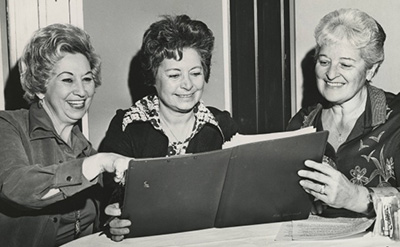UNLV Libraries Receives Grant to Build the Southern Nevada Jewish Community Digital Heritage Project
The UNLV University Libraries is gearing up to launch the Southern Nevada Jewish Community Digital Heritage Project. We recently received a grant through the Library Services and Technology Act (LSTA) funded by the Institute of Museum and Library Services (IMLS) and administered by the Nevada State Library and Archives. The project has two objectives: 1) to create a digital collection that will provide online access to historical resources about the Jewish community in Southern Nevada and 2) to initiate a strategic collecting initiative that will ensure the preservation of and access to historical primary sources about this community. Grant funding will run from July 1, 2014-June 2015. We hope to raise private funds as well to extend this into a three-year initiative.
To create a digital collection about the Jewish experience, in the first year we plan to digitize approximately 25 oral histories and videos, and over 500 documents and photographs from our existing holdings. We will also add contextual information to reveal many facets of the Jewish experience: synagogues and religious life; Holocaust survivors; Jewish community leaders and politicians; Jewish philanthropy; and the Las Vegas businesses and institutions in which Jewish individuals were integral. We will also investigate digitizing and adding local Jewish newspapers: the Jewish Reporter and the Las Vegas Israelite.
To safeguard Jewish history in our region for future generations, we plan to identify, collect, and preserve historical content about the Las Vegas Jewish experience. We will collect oral histories, organizational archives, personal and family archives, scrapbooks, photographs, videos, letters, newsletters, and more. The UNLV University Libraries Oral History Research Center will conduct approximately 25 new interviews with a diverse sample of Jewish people. We also plan to film roundtable discussions with Jewish leaders and community members. In addition, we will receive and make available autobiographies and video interviews from Las Vegas Holocaust survivors. We plan to host scanning days in the community to gather more historical materials. We will also work with community advisory boards to identify individuals and organizations with historical records. All of the archival materials will be preserved and made available according to national best practices, with the intent of making significant content available on the web in the future.






